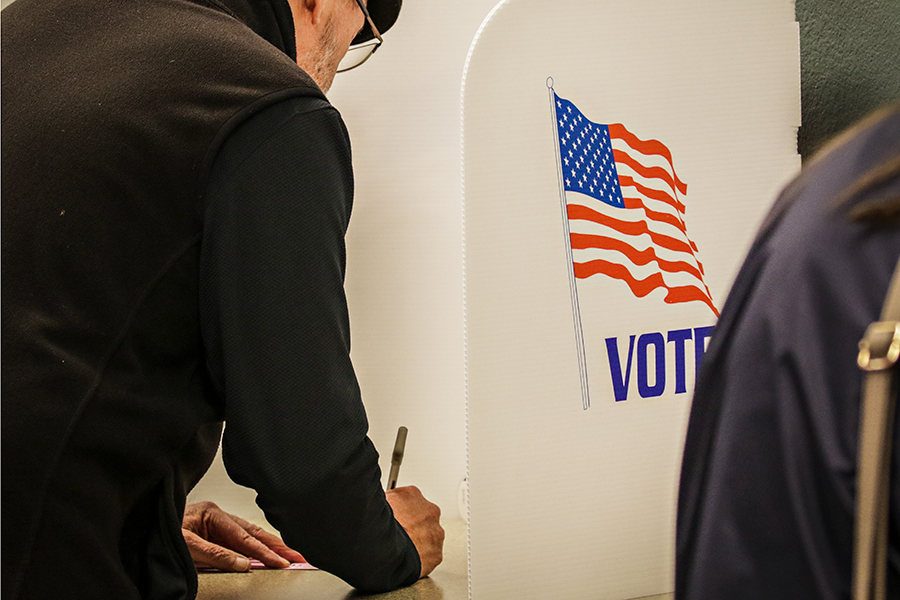Missoula County GOP to Republican Election Skeptics: ‘No Voter Fraud’
Despite repeated allegations by Republican lawmakers, a count of ballot envelopes by Missoula’s Republican Party turned up no evidence of voting irregularities in 2020
By Alex Sakariassen, Montana Free Press
The Missoula County Elections Office and the Missoula County Republican Party spent roughly 20 hours this week counting ballot affirmation envelopes from the county’s 2020 general election. Local party chair Vondene Kopetski said the effort was designed to “lay to rest once and for all” allegations of voting irregularities that arose from a citizen count of the envelopes early last year.
The latest count, conducted by elections office staff and observed by GOP volunteers, came up with a total of 71,853 envelopes — 71 envelopes shy of the 71,924 listed as received by the county in November 2020. Kopetski characterized the discrepancy as “statistically insignificant.”
“I’m 100% confident in the results of our process,” Kopetski told Montana Free Press, adding that “everybody, regardless of their party, can feel confident that their vote counts in Missoula County.”
Missoula County Elections Administrator Bradley Seaman echoed that confidence, noting that the 71-envelope discrepancy is within the margin-of-error range typical of a post-election canvass, and is attributable to what he called “the human element.”
Missoula’s 2020 election became the focus of considerable debate last spring after Rep. Brad Tschida, R-Missoula, spearheaded a citizen effort to hand-count affirmation envelopes submitted by voters with their mail-in ballots. That count, made possible by a public records request filed by Tschida, took 20 volunteers five hours to complete and resulted in the group reporting a 4,592-vote discrepancy between the number of envelopes and the number of votes cast countywide. Tschida’s subsequent allegations of voting irregularities prompted a rebuke from the Missoula County Commission, which questioned the accuracy of the group’s count and its process and dismissed Tschida’s claims as “baseless.”
Kopetski said she grew concerned about the impact of Tschida’s allegations after hearing from numerous voters last year that they felt “disenfranchised” and didn’t plan to vote again because their vote “wouldn’t count.” She said the county GOP wasn’t consulted about the Tschida-led effort, and she began working with Seaman in October to craft a process for a second count. After months of negotiation, the two finally settled on the process conducted March 28 and 29. This time, staff from the elections office did the counting while party volunteers observed and kept their own tally. Kopetski and Seaman said that after each bundle of envelopes was counted, Seaman’s staff would switch seats and count the bundles again for verification.
“That’s the biggest difference [from the previous count], is that cross-confirmation on the count helps ensure accuracy,” Seaman said. “The other big difference is that we tracked the work that we were doing, so the people who were going through and doing this process signed off on their work and showed that they’d counted each box and which box they had counted.”
Kopetski estimated that with volunteers and supervisors also observing, each envelope was counted between three and five times. She added that the party’s volunteers also supervised the transportation and unloading of the boxes containing the envelopes, and went so far as to run their hands along the tops of them “to make sure there was an appropriate amount of dust on that pallet, indicating that they hadn’t been tampered with.”
Seaman said his office invoiced the Missoula County GOP $5,000 for fulfilling its records request, but will likely refund half that amount as they’d originally budgeted for four full days of staff time.
While Kopetski hopes this week’s results will finally put the Missoula County issue to rest, she said it will ultimately depend on people’s willingness to believe in the accuracy of the work.
Lyn Hellegaard, a former Missoula City Council member who was involved in the previous envelope count, told MTFP that she stands by the process her group used in January 2021. She noted that unlike last year, the latest count was conducted not by volunteers but by election office employees. As far as resolution goes, Hellegaard said her underlying problem is that 15 months have passed since the first count was conducted.
“Too much time has passed for anything meaningful to happen,” she said, adding that she plans to remain focused on potential “fixes” to state law in the 2023 Legislature that will address the concerns raised by last year’s count.
Tschida did not immediately respond to a voicemail and text seeking comment. He was one of 10 lawmakers last month who requested that Republican Secretary of State Christi Jacobsen poll the Legislature about calling a special session in May for the purpose of voting on the establishment of a special committee to investigate election security in Montana.
“The conditions warranting the call,” Tschida and the others wrote in their request, “are the continuing and widespread belief, among a significant majority of Montana voters, that sufficient irregularities in election security in Montana create serious doubt as to the integrity of elections in our state.”
In light of the Missoula County GOP’s effort this week, Kopetski sees that call as a needless waste of taxpayer dollars.
“Our results show that there is no voter fraud, at least the type that was being alleged as with missing affirmation envelopes,” Kopetski said. “So I think it’s disingenuous to be calling for a special session that would use taxpayer dollars when there is no problem.”
This story originally appeared in the Montana Free Press, which can be found online at montanafreepress.org.